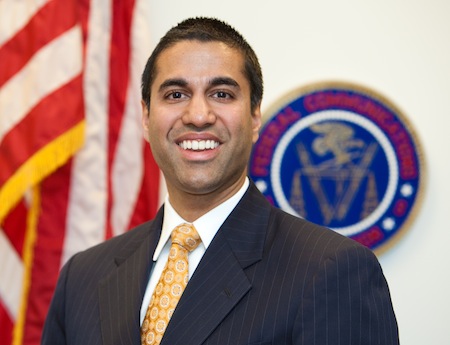Pai Pans 'Truthy' Study

The smarter way to stay on top of broadcasting and cable industry. Sign up below
You are now subscribed
Your newsletter sign-up was successful
"Truthiness" shall not set you free, and could be a vehicle to crack down on the political right suggests FCC Commissioner Ajit Pai.
In an Oct. 18 op ed for the Washington Post, Pai says he is concerned that a new study, which he says is targeting "social pollution" on Twitter and funded by the National Science Foundation, is an effort to discourage political speech.
He points to the study's aim of detecting "social pollution," which says includes "political smears," "astroturfing" and other "misinformation."
The study, from Indiana University researchers has been tabbed "Truthy," the meaning of the word coined by Stephen Colbert as "truth that comes from the gut, not books."
The researchers say the goal is to find out "why some ideas cause viral explosions while others are quickly forgotten."
"A government-funded initiative is going to 'assist in the preservation of open debate' by monitoring social media for 'subversive propaganda' and combating what it considers to be 'the diffusion of false and misleading ideas'? The concept seems to have come straight out of a George Orwell novel," says Pai in the Post piece.
He likens it to the proposed FCC "Critical Information Needs" study, which was ultimately scrapped following pushback from Pai and others, that planned to poll journalists on what they covered and why.
The smarter way to stay on top of broadcasting and cable industry. Sign up below
Pai says the Truthy study focused on political speech: "Truthy keeps track of which Twitter accounts are using hashtags such as #teaparty and #dems. It estimates users' 'partisanship.' It invites feedback on whether specific Twitter users, such as the Drudge Report, are 'truthy' or 'spamming.' And it evaluates whether accounts are expressing 'positive" or "negative' sentiments toward other users or memes.
Pai pointed to a Twitter-focused 2012 paper from the study project's leaders on "Asymmetries in online political activity" in which they talked of a "highly-active, densely-interconnected constituency of right-leaning users using [Twitter] to further their political views."
How should the FCC have responded to the request for funding for the study, asks Pai: "#absolutleynot."
Contributing editor John Eggerton has been an editor and/or writer on media regulation, legislation and policy for over four decades, including covering the FCC, FTC, Congress, the major media trade associations, and the federal courts. In addition to Multichannel News and Broadcasting + Cable, his work has appeared in Radio World, TV Technology, TV Fax, This Week in Consumer Electronics, Variety and the Encyclopedia Britannica.

